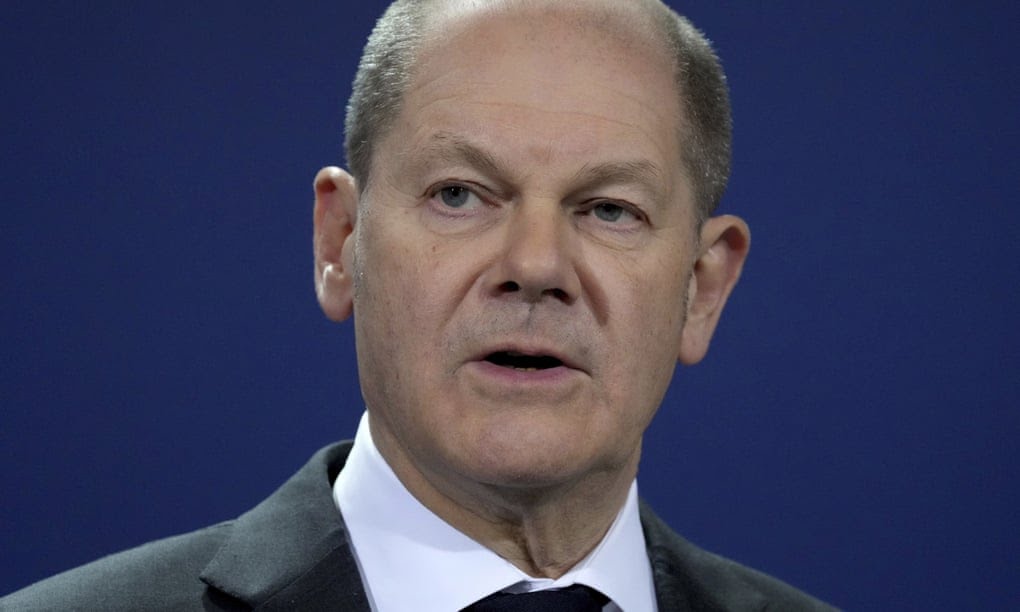•Olaf Scholz will fly to Washington as part of diplomatic effort to convince Nato he can be relied upon
By Daniel Boffey
Germany is preparing to send reinforcements to its battle group in Lithuania as the chancellor, Olaf Scholz, headed to Washington to reassure Nato allies his country can be relied upon over the Ukraine crisis.
Tentative planning for a further deployment of German military force follows weeks of criticism of Berlin’s approach to Russia’s mobilisation of 145,000 troops on the border with Ukraine.
The German government has refused to act on Kyiv’s calls for arms and has been vague over the future of the Russian Nord Stream 2 gas pipeline to Germany in the event of an incursion over the Ukrainian border.
But in an interview with the Funke media group, Germany’s defence minister, Christine Lambrecht, emphasised her government’s continuing military commitment on Nato’s eastern flank.
“We [Germany] are already making a very important contribution in Lithuania, where we are the only country in the European Union to have a battle group,” she said. “As a matter of principle, additional troops are available as reinforcement, and we are in talks with Lithuania at the moment to find out what exactly would make sense in this regard … Everyone in Nato can rely on us.”
Since Russia’s annexation of Crimea in 2014, there have been four battle groups containing a total of 5,000 troops in Estonia, Latvia, Lithuania and Poland led by the US, Germany, Canada and Britain. Germany provides about half of the 1,200 Nato troops in Lithuania.
The US has ordered a further 3,000 troops to strengthen Nato’s eastern allies, with the first arriving on Saturday at Rzeszow military base in south-eastern Poland. On Sunday, 300 troops from the US 18th Airborne Corps arrived in Wiesbaden, Germany.
As discussions over troop reinforcements continue, the German government will go on a diplomatic foray this week, with Scholz due at the White House on Monday and Germany’s foreign minister, Annalena Baerbock, expected in Ukraine on Monday and Tuesday, where she will inspect the frontline between Ukrainian troops and areas held by Russian-based separatists.
Following a meeting with the US president, Joe Biden, Scholz will also welcome heads of state and government of the Baltic states to Berlin on Thursday to discuss the security situation in eastern Europe.
It will be the start of a frenetic period of diplomatic activity, with Moscow believed by US intelligence to have now assembled at least 70% of the firepower it needs to launch a major military operation by mid-February.
On Sunday, the White House’s national security adviser, Jake Sullivan, said an attack could be launched as soon as Monday or come weeks down the line. Before Scholz’s visit, he also emphasised that he believed Nord Stream 2 would not go forward in the event of an incursion.
Scholz, who took over from Angela Merkel in December, is due to visit Ukraine on 14 February and the Russian president, Vladimir Putin, at the Kremlin the next day. The French president, Emmanuel Macron, is seeing Putin on Monday, while the British foreign secretary, Liz Truss, will see her Russian counterpart, Sergei Lavrov in Moscow this week, the first such visit for four years.
Last week, Fiona Hill, a former US intelligence officer on Russia and Eurasian affairs, told a congressional hearing that Putin “already has had something of a win because he’s got our undivided attention and part of the exercise was clearly to get us to focus on him”.
EU diplomats concede that Putin has also been successful in highlighting fissures in the west’s approach, with the bloc’s leadership left out of the top-table peace talks and clear breaches emerging in a common line on the crisis.
Last week while seeing Putin in Moscow, Hungary’s prime minister, Viktor Orbán, cast himself as a longtime ally of the Russian leader, informing the Kremlin that the EU was “ready for a reasonable agreement”.
In an interview published on Sunday, Lambrecht, who became defence minister in December, defended Germany’s attitude, including the rejection of a request from Kyiv for missile defence systems, tools for electronic warfare, night-vision goggles, digital radios, radar stations and military ambulances. The German government was widely mocked for instead sending 5,000 protective helmets and a field hospital.
Lambrecht said: “It has long been the clear stance of the federal government, even in previous legislative periods, that we do not deliver weapons to crisis areas in order not to escalate further there.
“In the Ukraine conflict we have negotiating partners who have come back to the negotiating table … That is why it is now our task to de-escalate. We want to resolve this conflict peacefully.”
Scholz has said the future of Nord Stream 2 will be on the table as part of a package of economic sanctions in the event of a Russian incursion into Ukrainian territory, but he has been shy of making any stronger statements in public.
Last week, Ursula von der Leyen, the European Commission president, appeared to follow the US administration’s lead in trying to box Berlin in on the issue. “Nord Stream 2 cannot be excluded from the sanctions list, that is very clear,” she said.
Credits | GuardianUk

